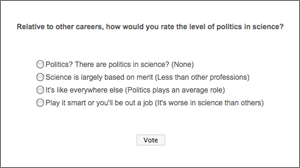 What do Lamborghinis, Rolexes, elevators in your house, and artichoke dip have in common? They’re all things we dreamed of as kids. Hold on- not everyone’s a Rolex fan. Actually, they’re all objects you can use to impress your friends! Luckily, one of those items costs less than our annual salary…
What do Lamborghinis, Rolexes, elevators in your house, and artichoke dip have in common? They’re all things we dreamed of as kids. Hold on- not everyone’s a Rolex fan. Actually, they’re all objects you can use to impress your friends! Luckily, one of those items costs less than our annual salary…
BenchLife
Being a scientist isn’t just about doing experiments, so neither are we. This is where we make breakthroughs beyond the bench for scientists.
Politics in Science? Surely We’re Not as Bad as Congress…
by
 These days, it’s hard to ignore Washington. With increasingly partisan bickering and near record low congressional approval ratings, it’s clear to see how politics in the workplace (especially when it’s politics itself!) can affect job performance. But as a career, how does science rate- are internal politics preventing real progress?
These days, it’s hard to ignore Washington. With increasingly partisan bickering and near record low congressional approval ratings, it’s clear to see how politics in the workplace (especially when it’s politics itself!) can affect job performance. But as a career, how does science rate- are internal politics preventing real progress?
The Short Straw Works the Graveyard Shift
by
 The Slate Rock and Gravel Company was way ahead of their time. They realized that although they had a big labor force, their work was limited by the number of Dino-cranes. However, by splitting the workforce into multiple shifts, they would be able to mine the quarry much faster than if they relied solely on a single shift by Fred Flintstone. What if one day our P.I.s came to the same realization…
The Slate Rock and Gravel Company was way ahead of their time. They realized that although they had a big labor force, their work was limited by the number of Dino-cranes. However, by splitting the workforce into multiple shifts, they would be able to mine the quarry much faster than if they relied solely on a single shift by Fred Flintstone. What if one day our P.I.s came to the same realization…
How to Survive a Boring Seminar (and win some bets at the same time)
by
 With the American Chemical Society meeting in San Francisco next week, large-format printers around the world are working overtime to get all of the posters ready to go. While you’re printing things out, we’ve prepared one more sheet that we think will help deal with one of the biggest problems facing meeting attendees…
With the American Chemical Society meeting in San Francisco next week, large-format printers around the world are working overtime to get all of the posters ready to go. While you’re printing things out, we’ve prepared one more sheet that we think will help deal with one of the biggest problems facing meeting attendees…
What Diseases Will We Tackle Over the Next Decade?
by
 The 2004 World Health Organization list of the Top 10 Causes of Death worldwide includes many familiar faces. Although the results are grouped as low-, middle- and high-income countries, it’s largely just the order of diseases that change. But what will these lists look like in 10 years?
The 2004 World Health Organization list of the Top 10 Causes of Death worldwide includes many familiar faces. Although the results are grouped as low-, middle- and high-income countries, it’s largely just the order of diseases that change. But what will these lists look like in 10 years?
How Important is Recognition in a Career of Research?
by
 Science is not a career that most people go into for money. The pursuit of discovery, the intellectual challenge, the opportunity to contribute to society – these are often-cited reasons for following the research path. In fact, sometimes more valuable than money is the praise and recognition we receive from our colleagues. But how strong, exactly, are our principles?…
Science is not a career that most people go into for money. The pursuit of discovery, the intellectual challenge, the opportunity to contribute to society – these are often-cited reasons for following the research path. In fact, sometimes more valuable than money is the praise and recognition we receive from our colleagues. But how strong, exactly, are our principles?…
Should Your Beaker be Half-Empty or Half-Full?
by
 At some point in our careers we have likely worked with a King Midas- a person for whom experiments just always seem to work. They tend to have an outlook that experiments should work and they seem genuinely shocked when they fail. We’ve probably also worked with a colleague who assumes the natural state of the universe is failure, and thus sees an unsuccessful experiment as par for the course. But is one a better scientist than the other?
At some point in our careers we have likely worked with a King Midas- a person for whom experiments just always seem to work. They tend to have an outlook that experiments should work and they seem genuinely shocked when they fail. We’ve probably also worked with a colleague who assumes the natural state of the universe is failure, and thus sees an unsuccessful experiment as par for the course. But is one a better scientist than the other?
Does Anyone Still Read Entire Journals?
by
 Believe it or not, it wasn’t long ago that reading the literature required hours spent in the library- navigating chem abstracts, printing citations, locating journals and (finally) reading articles. An easier way to keep up in those days was just to regularly thumb through a handful of relevant journals as the new issues were released. We’ve come a long ways since those days and the internet has certainly changed the way we monitor and read the literature.
Believe it or not, it wasn’t long ago that reading the literature required hours spent in the library- navigating chem abstracts, printing citations, locating journals and (finally) reading articles. An easier way to keep up in those days was just to regularly thumb through a handful of relevant journals as the new issues were released. We’ve come a long ways since those days and the internet has certainly changed the way we monitor and read the literature.
LabLibs: The Passive-Aggressive Instrument Note
by
What Do You Want from Your PI?
by
 Last week, we asked everyone what they truly thought of the people they work for. It was our turn to grade our PIs and supervisors. The most popular response revealed that although things could certainly be worse, they could also be better (see Figure 1).
Last week, we asked everyone what they truly thought of the people they work for. It was our turn to grade our PIs and supervisors. The most popular response revealed that although things could certainly be worse, they could also be better (see Figure 1).


